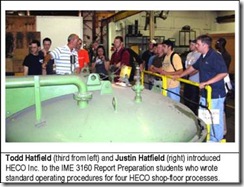This summer’s IME 3160 Report Preparation class gained real-world work experience writing standard operating procedures (SOP).
Students in the course taught by Thomas Swartz wrote SOPs for HECO, Inc. Industrial Groups. Headquartered in Kalamazoo, HECO is a repair and sales organization that has served the motor needs of more than 1500 companies for nearly half a century. Started as the Hatfield Electric Co. by Terrell Hatfield in 1959, HECO now has more than 50 employees working a two-shift operation.
According to Todd Hatfield, vice president of engineering and repair, the company has been trying to update its SOPs for some time, but something more important always “put them on the backburner.”
A plan to have the 16 IME 3160 students work in groups of four and write SOPs was developed by Hatfield; Justin Hatfield, HECO’s equipment management specialist; and Swartz, who coordinates the CEAS technical communication program. Each group wrote one shop-floor SOP.
The students – all industrial engineering (IE), electrical engineering (EE), and engineering management (UEM) majors –also proposed improvements to the SOP template and process.
“We generally write textbook scenarios in class,” Swartz said. “With the SOP project, HECO offered the students a real work-related writing experience.”
HECO provided a SOP template for use as a starting point. “We were encouraged to be creative in the SOP design,” said Jason LaDuke, a UEM junior whose group wrote the SOP “Disassembly of a Standard AC Motor.”
The assignment challenged the students, whose first goal was to meet with support groups of HECO personnel who actually do the processes featured in the SOPs. “We had to learn how to disassemble an electric motor before we could write about it,” LaDuke said.
The students communicated with the support groups via phone and email, and they worked together on line and off to develop SOPs. “Much of our work was planning, writing instructions, and letting everyone in the group and at HECO review them as we went along,” said IE senior Yenni Chen.
According to Justin Hatfield the HECO support groups were “impressed with the questions the students asked.” The SOPs need to be further tested by those not familiar with the SOP processes.
Each group presented its SOP and proposed template and other recommendations in an oral presentation to an audience that included both Hatfields. “I think everyone did a good job,” Todd Hatfield said. “I was impressed with their ideas and their proposals.”
After examining the details, Todd Hatfield said that some student work appeared to be very high quality and that he would consider employing some of the students to write additional SOPs.
Swartz said the successful collaboration between HECO and the students may be repeated in the future. For more information, contact thomas.swartz@wmich.edu





